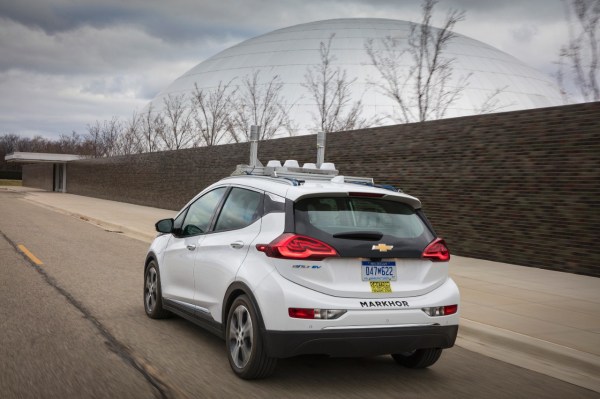GM is going to start building its next generation of self-driving vehicles at the Michigan plant where it builds its Chevrolet Bolt, the company’s CEO Mary Barra announced Thursday. It will also be testing vehicles on public roads in metro Detroit, GM said. GM is already testing self-driving vehicles using autonomous systems created by Cruise, the startup it acquired earlier this year, in both San Francisco, California and Scottsdale, Arizona.
The Michigan testing is clear to proceed after state governor Rick Snyder signed into law legislation that allows expanded testing of autonomous vehicles on public roads by companies and organizations. It also allows the purchase and use of autonomous vehicles by consumers once the tech is ready, and the use of such cars by ride-hailing providers, including companies like Uber or those run by automakers themselves.
Barra explained in a LinkedIn post that Michigan provides a lot of variety in terms of real-world testing conditions compared to its existing trial cities, including a “wide range of road, weather and climate conditions,” which include snow in significant volume and much colder temperatures. She notes that their test areas will now cover everything from “desert heat[…] to crowded streets” across the cities where they have a presence. As of September, Cruise had around 30 self-driving test cars in operation in SF and Scottsdale combined.
In the blog post, Barra noted that GM is committed to an autonomous vehicle future in large part because of the benefits they provide customers due to potential improvements in “safety, convenience and quality of life.” Barra cited 2015 traffic statistics from the U.S. Department of Transportation, which counted over 35,000 traffic-related deaths, around 90 percent of which were due to human driver error.
In an interview with Barra captured by CNBC at a press conference in Detroit announcing the news, Barra explained why she believes GM has an advantage when it comes to competing with other companies developing autonomous driving tech.
“We have 100 years of really understanding vehicles, putting them on the road, making sure we have a safe, high-quality vehicle,” she told reporters. “When you take autonomous, electrification, connectivity, I think we are going to have a very special offering to the consumer.”
Barra said that while there are over 100 people working in Silicon Valley on GM’s autonomous driving systems, they will “work seamlessly” with teams based in Michigan as the new manufacturing of its next-generation assembly facility near Lake Orion, Michigan, kicks off early next year. The Orion plant is where GM assembles the Bolt EV, which is the car GM uses as the base of its current-generation Cruise autonomous test cars.
“In today’s work world, location isn’t so important,” she added, regarding the distributed nature of GM’s autonomous engineering efforts.
